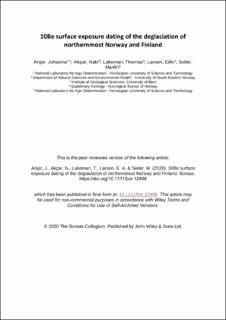10Be surface exposure dating of the deglaciation of northernmost Norway and Finland
Peer reviewed, Journal article
Accepted version
Permanent lenke
https://hdl.handle.net/11250/2735705Utgivelsesdato
2020Metadata
Vis full innførselSamlinger
Originalversjon
Anjar, J., Akçar, N., Lakeman, T., Larsen, E. A., & Seiler, M. (2020). 10Be surface exposure dating of the deglaciation of northernmost Norway and Finland. Boreas, 50(2), 369-380. https://doi.org/10.1111/bor.12498Sammendrag
During the Last Glacial Maximum, the coast of Finnmark county, northern Norway, was covered by the Scandinavian Ice Sheet (SIS), which coalesced with the Barents Sea Ice Sheet (BSIS) off the coast. The region is thus important for our understanding of the dynamic interactions between the BSIS and the SIS, yet it remains one of the least dated regions covered by the SIS. To improve the chronological constraints, we present 23 new 10Be ages from eight localities in northernmost Norway and Finland, and discuss implications for the pattern and timing of ice‐sheet retreat in the region. The samples were collected along a 240‐km‐long north–south transect ranging from the outer coast of Nordkinn peninsula (Norway) to Lake Inarijärvi (Finland). The new exposure ages indicate deglaciation of the outer coast at ~14.5 ka. From there, the ice retreated southward until it reached the Main substage moraine complex just north of the Norwegian‐Finnish border during the Younger Dryas. South of the Main substage moraines the deglaciation appears to have become more rapid, eventually reaching Inari, at the southern end of our transect, around 10.4±1.4 ka.
